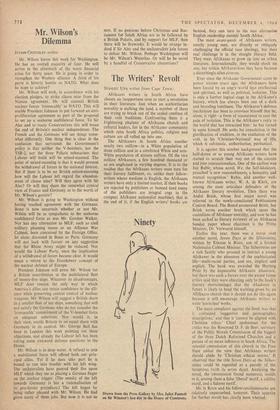Mr. Wilson's Dilemma
JULIAN CRITCIILEY writes:
Mr. Wilson leaves this week for Washington. He has an overall majority of four. He will arrive in the aftermath of the worst financial crisis for thirty years. He is going in order to strengthen the Western alliance. A third of his party is bitterly hostile to NATO. What does he hope to achieve?
Mr. Wilson will wish, in accordance with his election pledges, to strike clause nine from the Nassau agreement. He will commit British nuclear forces irrevocably' to NATO. This will enable President Johnson to put forward an anti- proliferation agreement as part of the proposal to set up a seaborne multilateral force. To Sir Alec and to many Conservatives this will mean the end of Britain's nuclear independence. The French and the Germans will see things some- what differently. One thing that is clear in the confusion that surround's the Government's policy is that neither the V-bombers, nor the TSR-2, nor the three Polaris submarines that Labour will build will be mixed-manned. The point of mixed-manning is that it would prevent the withdrawal of forces in the national interest. But if there is to be no British mixed-manning how will the Labour left regard the abandon- ment of clause nine? Will they agree with Sir Alec? Or will they share the somewhat cynical view of France and Germany as to the worth of Mr. Wilson's gesture?
Mr. Wilson is going to Washington without having reached agreement with the Germans. Bonn' is now uncertain whether or not Mr. Wilsdn Will be as sympathetic to the seaborne multilateral force as was Mr. Gordon Walker. Nor hat any alternative to MLF, such as civil military planning teams or an Alliance War Cabinet, been conceived by the Foreign Office, let alone discussed in Bonn or Paris. Germany will not look with favour on any suggestion that the Rhine Army might be reduced. Nor would the Labour Party, once the implication of a withdrawal of forces became clear. It would mean a return to the Eisenhdwer concept of the nuclear defence of Europe.
President Johnson will press Mr. Wilson for a British contribution to the multilateral fleet of twenty-five ships. Whatever its disadvantages, MLF does remain the only way in which America's allies can retain confidence in the alli- ance while preserving central control of nuclear weapons. Mr. Wilson will suggest a British share in a smaller fleet of ten ships, something that will not satisfy the Germans who do not consider the Irrevocable" commitment of the V-bomber force an adequate substitute. Nor would it, in their view, entitle Britain to an equal share with Germany in its control. Mr. George Ball has been in London this week pointing out these objections, and already the Labour left has been asking some awkward defence questions in the House.
Mr. Wilson is in deep water. A refusal to join a multilateral force will offend both our prin- cipal allies. Yet if he does take part he is bound to run into trouble with his left wing. The unilateralists have poured their fire upon MLF which they see as placing a German finger on the nuclear trigger. (The enmity of the left towards Germany is but a rationalisation of its pro-Soviet prejudices.) The left began by being rather pleased with Mr. Wilson. He had given many of them jobs. But now it is not so sure. If no pensions before Christmas and Buc- caneers for South Africa are to be followed by a British Polaris, and by support for MLF, then there will be fireworks. It would be strange in- deed if Sir Alec and the unilateralists join forces to defeat Mr. Wilson. Perhaps Washington will be Mr. Wilson's Waterloo. Or will he be saved by a handful of Conservative abstentions?


































 Previous page
Previous page